- Home
- New Kyurizukai
- SCIENCE AND TECHNOLOGY STUDIES
from Keio's Faculty of Science and Technology
SCIENCE AND TECHNOLOGY STUDIES
from Keio's Faculty of Science and Technology
Initiating creative collaboration between humanities and sciences
To broaden your horizons, you must first look within
Koichi Mikami has spent his career exploring the ways in which science, technology, and society are interwoven, listening to people’s unique perspectives on how science and technology impact their lives. While he now believes that scientists and engineers should work alongside experts in humanities and social sciences, it took a combination of various experiences to persuade him of this idea.
Koichi Mikami
Mikami specializes in Science and Technology Studies, and his research focuses on governance of life sciences and biotechnology. In 2004, Mikami graduated from the School of Political Science and Economics at Waseda University. In 2010, he completed his doctoral program at Said Business School, University of Oxford. He received his D.Phil. (Oxon) a year later in 2011. Mikami has worked as an Assistant Professor at the Center for the Promotion of Integrated Sciences at the Graduate University for Advanced Studies; a Research Fellow in the Science, Technology and Innovation Studies group at the School of Social and Political Science, University of Edinburgh; and a Specially Appointed Lecturer at the Science Interpreter Training Program of the Komaba Organization for Educational Excellence, University of Tokyo. In 2019, Mikami joined the Department of Foreign Languages and Liberal Arts, Faculty of Science and Technology, Keio University as an Assistant Professor. He began his current position in 2022.
The Research
This issue features Associate Professor Koichi Mikami, whose research, informed by Science and Technology Studies, explores the possibility of “science and technology to be done in collaboration with experts in humanities and social sciences.”
The Search for a New Way of Approaching Science and Technology
Guiding experts toward “creative collaboration” in science and technology
“We tend to think of science and technology as the work of scientists and engineers only. But I want to find a way to change that and let experts in humanities and social sciences to take part in their making,” says Mikami. He began to envision this ‘new’ paradigm through his research in Science and Technology Studies. Having joined Keio University, his journey to realize this vision has already begun.
What is “Science and Technology Studies”?
In 2018, the news that gene-edited twins were born in China took the world by storm. People criticized the birth of these twins whose genetic information had been altered to prevent HIV infections. Could the scientist responsible guarantee the children’s future health and safety? Is it even ethical to edit someone’s genome in the first place?
“I can understand why some people felt that might be justified as a form of medical treatment. However, this does not mean that it is okay on a societal level to edit the genomes of fertilized eggs,” explains Koichi Mikami, a specialist in Science and Technology Studies at Keio’s
Faculty of Science and Technology. “Science and Technology Studies” or “STS” is a field that examines the intersections between science, technology, and society, and Mikami’s research focuses particularly on life sciences and biotechnology.
In the past, science was thought to be a discovery of “the truth.” This meant that no matter who did the “science,” the results (and conclusions) would be the same. However, after being forced to recognize the enormous influence that scientific advancement can have on society due particularly to the Second World War, people started discussing what science is and how scientists should behave. Such discussion led to “Science Studies.” As the field broadened to include questions about technology, the name was changed to “Science and Technology Studies.” With this expansion, the field also began to consider how scientific discoveries impact society. When scientists began sequencing the entire human genome in the 1990s, many people expressed concerns about the magnitude of the ethical, legal, and social implications (ELSI) that this achievement might yield through identifying a person’s future diseases or other information.
“Historically, the role of humanities and social sciences has been limited either to put a stop to scientific and technological progress, or to assist it from the sidelines.” (Figure 1)
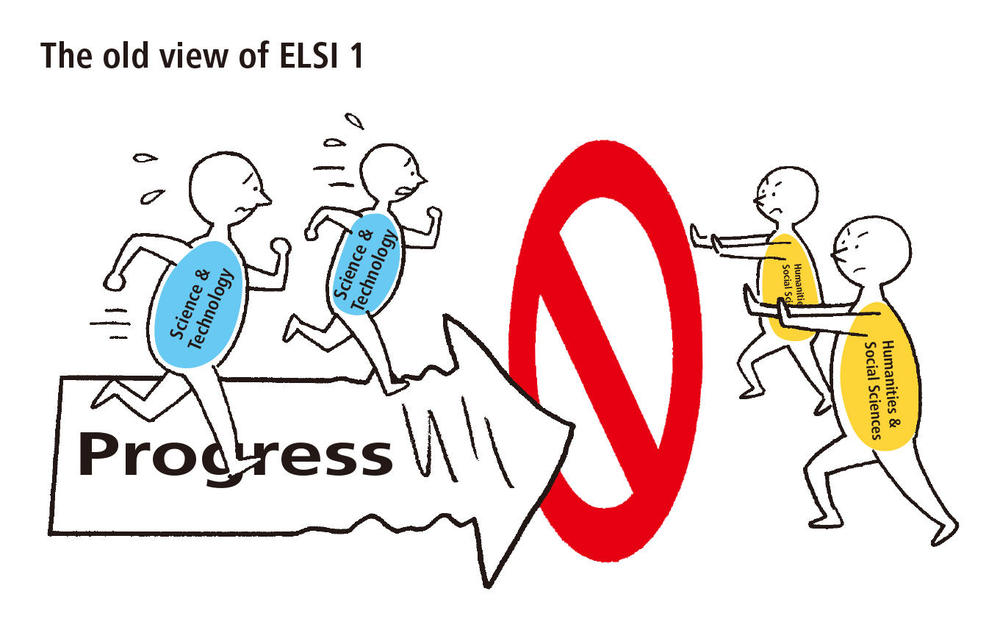
Fig.1 Ethical, Legal, and Social Implications (ELSI)
Because experts in humanities and social sciences would undertake ELSI analysis to point out social problems with science and technology, they were often thought of as standing in the way of further progress (The first old view of ELSI).
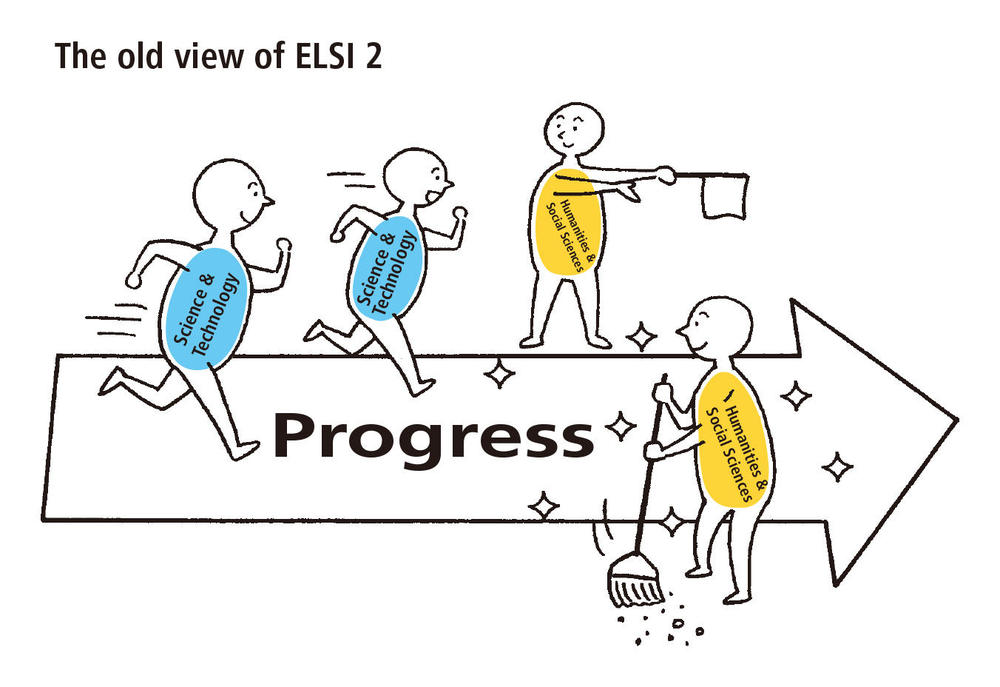
On the other hand, ever since the Human Genome Project, scientific research has been presumed unstoppable, so people in humanities and social sciences have been needed to support, from the sidelines, scientific advancements to be accepted by society (The second old view of ELSI).
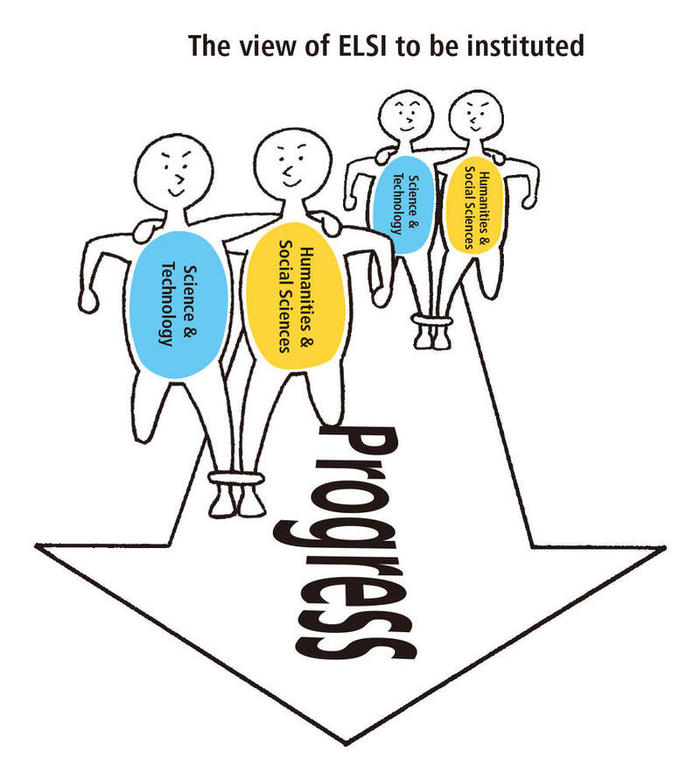
In contrast, Mikami hopes to build a mechanism in which scientists can work alongside experts in humanities and social sciences (The view of ELSI to be instituted).
Values about science and technology are culturally dependent
Mikami first became interested in the relationship between science, technology, and society in 2005 when he studied abroad in England as a Master student.
“It was around the time when hybrid cars were beginning to appear on the market. In Japan, they were hailed as a next-generation eco-friendly vehicle. In England, though, some people were saying that diesel cars were better. Up until that point, I had thought that values of science and technology were universal, so learning about national differences in technological preference was fascinating.” Hybrid cars work well in Japan’s driving culture where people are constantly starting and stopping their cars in towns. In England, where drivers can leave their engines running for long time on straight rural roads, however, diesel engines were considered more efficient.
That made Mikami want to do research on different national and cultural values attached to science and technology. He especially wanted to look into a topic in which these differences would be most stark, such as biomedicine. At the time, “regenerative medicine” was a huge topic of discussion, so he chose it as his focus. Mikami explains, “People tend to stick to things that they are familiar with when it comes to caring their bodies. This means that cultural influences or patterns from one’s upbringing will be quite evident.” Mikami came to this conclusion after conducting a survey on his fellow international students, many of whom asked their family to ship not only medicine but even toothbrushes from Japan, rather than purchasing these items locally in the UK.
Revealing the truth about regenerative medicine through interviews
Mikami’s research methodology involves interviewing as wide a variety of people connected to his chosen topic as possible. This includes researchers, people belonging to government agencies, or companies (Figure 2). When doing this, he first investigates presentations being given at academic conferences so that he can list up interview participants that best reflect general research trends for the given field in each country.
In his research on regenerative medicine, Mikami was surprised to find that the goals of the science changed drastically based on a person’s perspective on a medical system. “iPS cell-based therapies likely hold a strong appeal with a Japanese audience because the cells are taken directly from an individual and therefore enables regenerative medicine to be personally tailored.
Personalized regenerative medicine is not as popular elsewhere. In the UK, there is an emphasis on standardization, which allows for mass production so that medical care can be delivered at low-cost for the largest number of patients across the country. This has made the trajectory of stem cell therapy popular there instead.” Mikami’s findings helped him see clear distinctions between the attitudes in Japan and the UK. The experience of studying about iPS cell-based therapy then led Mikami to research the challenges of rare diseases and the role of patient organizations in addressing them.
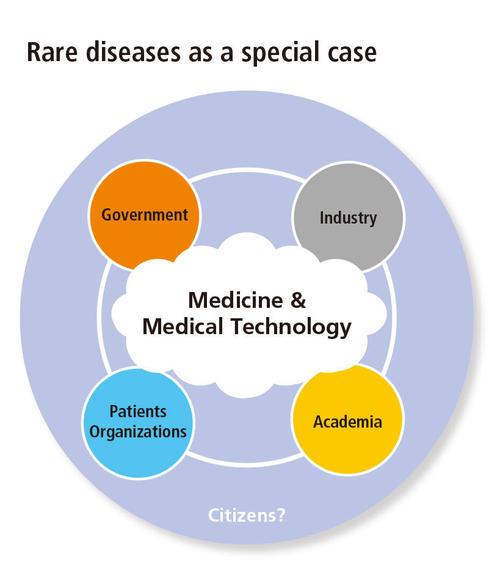
Fig. 2 Parties participating in scientific and technological research
When science and technology make progress, the academic community, governments, and corporations are often heavily involved, but input from the public tends to be very little.
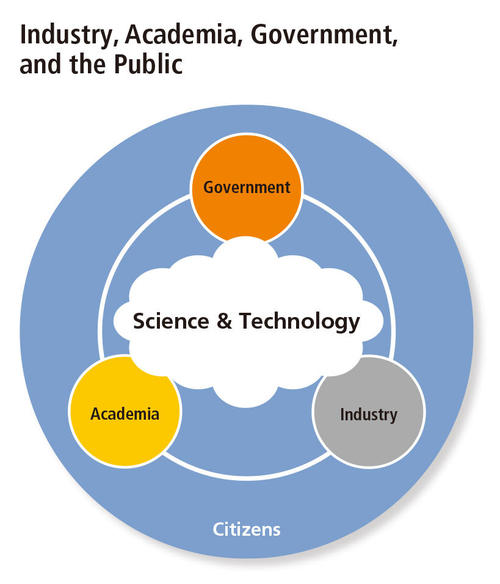
In contrast, Mikami's research suggests that in medicine and medical technology, segments of the public, namely patient organizations, have been heavily involved too. Particularly for rare diseases, as the number of their patients are very small, these organizations play vital roles in advancing their research. However, little attention is paid to input from other ordinary citizens.
The humanities and social sciences should be co-creators in science and technology
As Mikami was working on his research, he came to a realization. “When I approached and asked someone to talk about what they do, they sometimes responded as if I were about to judge their work. This is because up until today, experts in humanities and social sciences have only been involved as third-party observers in science and technology, arbitrating whether something was ‘good’ or ‘bad’ once the research was complete. I thought that this has to change.” In 2019, when Mikami became a faculty member at Keio University, he was given the chance to bring about this change. Mikami meets regularly with a group of researchers who specialize in different areas of science, such as biology, chemistry, and informatics in order to foster new scientific projects in artificial cells, molecular robotics, and others.
In this effort, Mikami uses his background in humanities and social sciences to gather a wide range of viewpoints and information about scientific research being conducted and try to organize them into a roadmap for the group, thereby facilitating productive discussions about the future direction of the projects. “I’ve taken it upon myself to be a go-between for these projects. I think it’s vital that people are able to debate the types of needs and issues a project
might face so that science and technology can be integrated successfully into society. Experts with different academic backgrounds often have different ways of thinking and doing research, so the meetings are full of stimulating discussions.”
When this team’s projects lead to new discoveries in the future, Mikami says “I want to be involved in research studying how the scientific knowledge or technologies produced can be meaningful in society. Each and every one of us, myself included, is working individually on research that we find fascinating. Coming together as a group without changing that is when we will truly achieve ‘creative collaboration,’ or what is sometimes called ‘co-creation.’” The results that this will bring about will make significant change in the relationship between humanities, social sciences, science, and technology.
Mikami is also passionate about educating students at Keio University. “The Faculty of Science and Technology is full of students who will be future researchers or who work at companies using their specialized knowledge. It’s worrying if these people are convinced that they ‘are doing everything right.’ I will be thrilled if my classes can be the inspiration for them to look at science and technology from diverse perspectives and see it as a complex practice in society.” This is Mikami’s motivation as he goes up to the class podium every day.
Interview
Associate Professor Koichi Mikami
Learning in an environment not be forced to study for exams until high school.
I understand that you attended both a junior and senior high school that was affiliated with Waseda University.
Between junior high, high school, and college, I spent 10 years at Waseda, all in all. When I was a high school student, a university professor came to my school and gave a lecture for us. I remember that I was surprised when I asked the professor a question after the lecture and he answered, “That’s a great question. Why don’t you do research about that?” I realized that, unlike what I had learned in high school, what is taught at university would often leave “unknowns” that you had to think about by yourself. And the professor was affirming about that. It was like I discovered a whole new world.
I was particularly interested in the idea of “poverty” and questions like what it really meant and whether capitalism was actually a “good” thing.
It seems like you were very mature for your age.
I don’t think so. I had friends who were much more mature than me. There was one time a friend of mine started telling me that when he leaves the room, I can’t see him anymore, and if I can’t see him, I have no way to tell whether he actually continue to exist or not. I remember at that time I thought he’d gone mad, but when I think about it now, it was an incredibly philosophical take. I think this is one of the advantages of going to university-affiliated schools. Students aren’t driven by test scores. You’re able to spend most of your time with things you have personal interest in, nurturing your individuality. Conversations with my friends often challenged my viewpoints. I also took a one-month intensive study abroad program in England and had a chance to see what life was like in a different culture. Though, it was definitely a good excuse to be away from my parents for a while too [laughs].
When you first enrolled as a college student, you were majoring in Economics, correct?
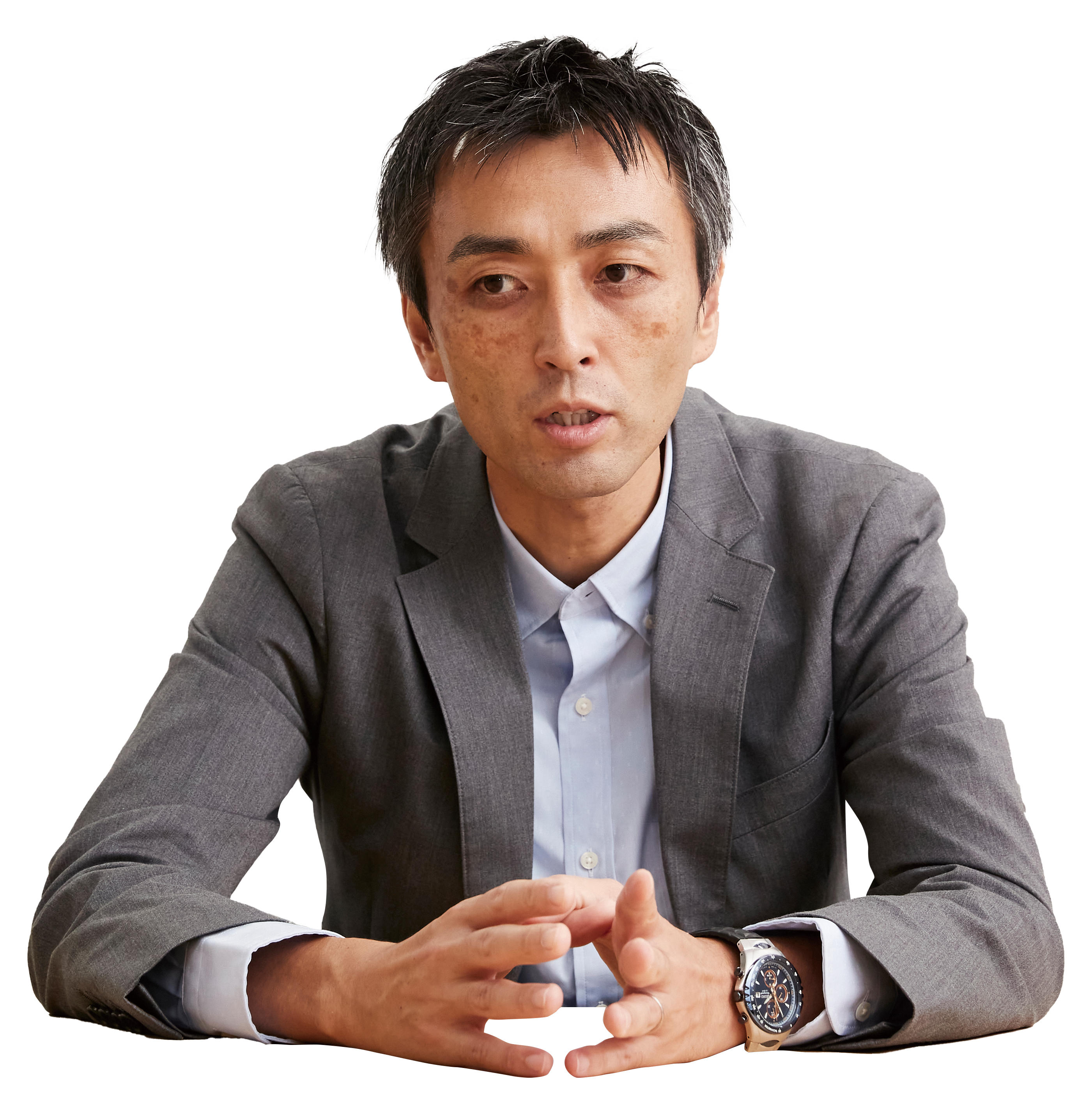
In the loosest definition of the word, yes. The study of economics seemed like the path towards realizing the better world. At the time, I thought that without money or “capital,” you couldn’t do anything to change the world, so I enrolled in the Faculty of Economics so that I could study how money is circulated. As I learned more, I realized that economics uses models to simplify almost everything. It doesn’t take into consideration culture or preferences much. It doesn’t really matter if you are thinking about Japan or England, you just assume that we are all the same. It didn’t fit with my interest at all. Actual consumers are distinct from one another. They hold different values and want different things, and we all know that from our own experience. Over time, my focus began to shift toward business theories that took consumer needs more seriously.
So what made you arrive at your current specialty, sociology?
At first, I was learning to become a business consultant, but I heard that without the degree of MBA, you couldn’t find any real job opportunities. This is when I decided to join a master’s program at Oxford University’s Said Business School. Back then, it was still a new graduate school trying to figure out how to study business amid people saying that business was not a real academic discipline. This allowed students to learn from a variety of perspectives and disciplines, one of which was sociology.
Around this time, as I mentioned in my research introduction, I became interested in studying the culturally-informed attitudes people had towards hybrid vehicles. I had to find a dissertation supervisor to pursue the idea, so I did a bit of research. I found out about Steve Rayner, a professor who specialized in climate change issues, and contacted him. He then suggested that I read something written by his mentor, the cultural anthropologist, Dame Mary Douglas. I remember when I had a meeting with Steve a few days later I tried to explain with my terrible English how the way people perceive society shapes cultural practices and other points that had caught my interest. From what Steve told me later, he was just trying to make sure that our research interests lined up, but I was quite desperate since I thought he was testing me [laughs].
Investigating research aimed at becoming a researcher
What kind of a person was Steve?
When we were having discussions, he would peer up at me from behind a book wearing his reading glasses and I always felt like he was assessing me. This terrified me at first, but he was actually incredibly kind. We had discussions over tea quite often. That was the first time I ever had such a close relationship with a university professor.
His research group was incredibly diverse, with fellow students from the UK, the United States, Tunisia, Singapore, Denmark and so on. My English skills were the worst of the group, so everyone was always trying to help me out. When I had meetings with Steve and came across new vocabulary that I didn’t understand, I frantically took notes so that I could look up the words later. When Steve found that out, he told me that I should just ask since that would help us communicate better.
Steve was very meticulous when it came to research. He would let you know straight out if you were making sense or not. When I first started my dissertation research, I was very nervous because I had no idea whether it was going well or not. Steve helped me overcome this. He always treated me as a research colleague even when I was still an inexperienced student.
Is this around the time you started to think about becoming a researcher?
I ended up having to abandon my research on hybrid cars since interviewing drivers as an international student with subpar English skills proved too difficult. Desperate to think of another topic I could pivot to, I started to look into what items Japanese students had brought with them from Japan while studying abroad. I found out that a lot of them had brought medicine and toothbrushes. Even for daily necessities, when something was
related to their bodies, people would stick with things that were familiar. In other words, there was a profound cultural link. This formed the basis of my master’s thesis.
My study was very well received by both Steve and other professors on my dissertation committee. When they came up to me and told me that I had done well, I was really happy. Knowing I had found an interesting topic and that I had effectively communicated it with other people filled me with joy, so I decided to continue my research.
In order to get a better foundation in sociology, I earned another master’s degree from the Sociology Department at the London School of Economics and Political Science, before pursuing my Ph.D. program. During this time, I was also thinking about the type of research I would like to do under Steve’s supervision once I returned to Oxford.
How has your research unfolded since then?
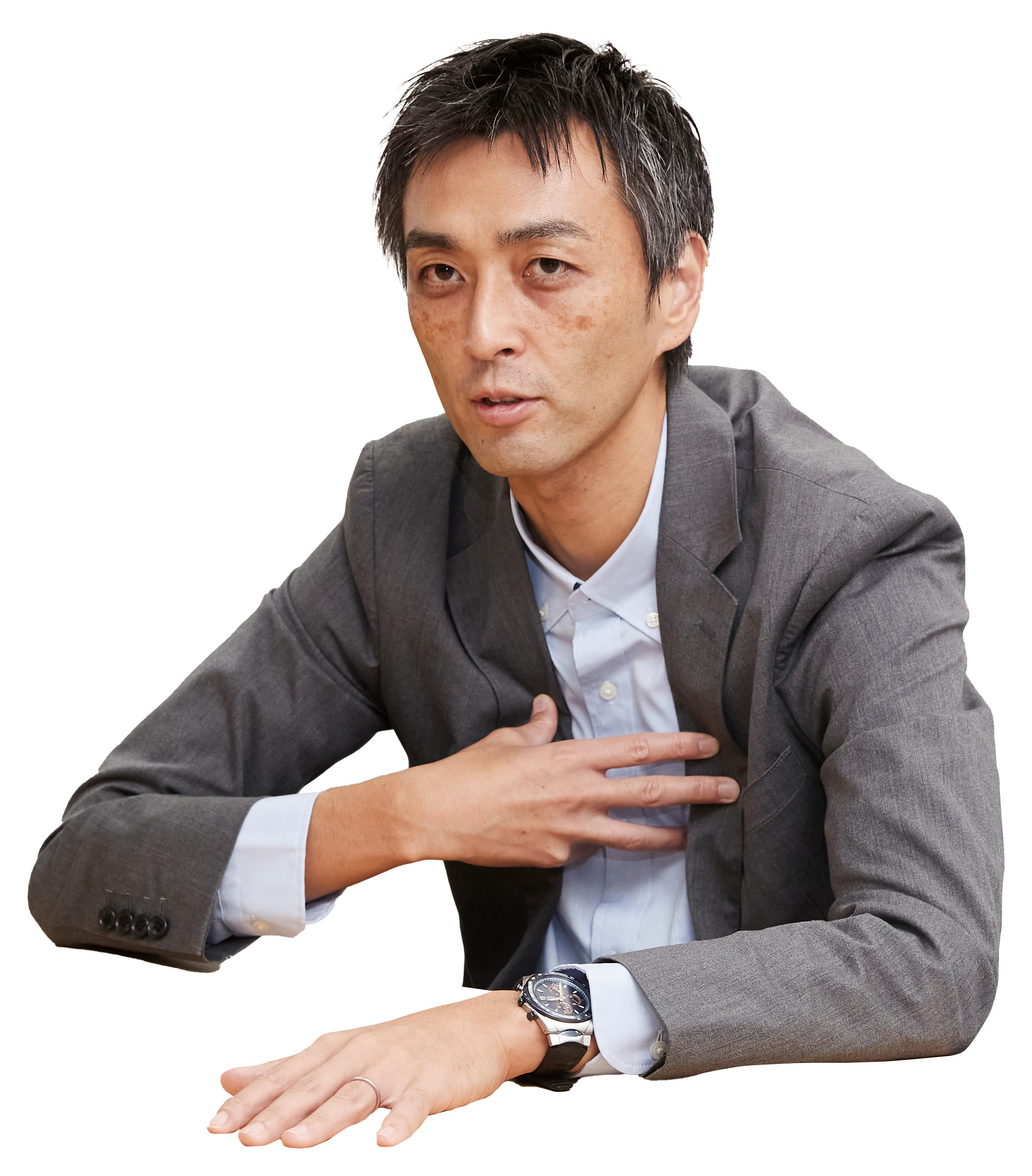
I went back to study with Steve, this time as a doctoral student studying regenerative medicine. While both Japan and UK invested a lot in regenerative medicine research, the differences in their medical systems and other circumstances have created a clear divide in the goals they are pursuing. Steve recommended that I publish my research as a book, but I ended up putting it off because I wanted to research the topic more. When I graduated, I found a job back in Japan, so I moved back here. However, I knew that Science and Technology Studies was much more active in the West, so I was determined to move back abroad one day. In 2014, I found a research position at the University of Edinburgh related to studying rare diseases. That was exactly the topic I was interested in at the time, so I spent three years doing case studies on rare diseases in the US and Europe where this type of research is thriving. This time around I brought my family along as well. My daughter, who turned five when we were there, attended an elementary school in Edinburgh which turned out to be an invaluable intercultural experience for both her as a student and me as a parent.
To create a successful example of “co-creation” between science/technology and the humanities/social sciences
It’s clear that you enjoy your research, but what do you do to relax?
I have been playing football since I was a kid. I still play futsal for fun once or twice a week. My son started to take an interest in football when he entered elementary school, so recently we kick a ball around in a park or go to watch professional football games together on weekends. At the very first game we went, he just sat in silence for a straight 90 minutes. At first, I thought he was bored, but on the way home he kept going on and on about the game, so I was really glad we went. It’s been a great way to bond as a family.
I chose England as my study abroad destination partly because it is a country where football was born and is still very popular. Thanks to football I was able to make friends when I was new to the country.
What kind of place is Keio University compared to all your experiences thus far?
Scientific and technological progress can’t be thought of only on their own terms, but also in terms of what they mean within society at large. This is the type of thinking I would like to see incorporated into a student’s university experience. Students here have the opportunity to be exposed to diverse cultural values through foreign language and liberal arts classes, which I think is a great thing.
For me personally, I actively reach out to my colleagues who conduct very interesting research in Yagami Campus. Some professors who are working in artificial intelligence have approached me too to help them think about the connections between their projects and society. This is where I hope to produce a successful model of “co-creation” between science, technology, social sciences, and humanities. From there, I would love to see this model spread to and inspire other universities and researchers. I am excited about what I have been able to start here at Keio and what the future might hold.
Some words from Students…
I feel like the connection between scientists and the general public has been missing, and that science and technology are just going off on their own. I took Professor Mikami’s class because I felt like discussing the social responsibility of science/scientists with other students of my age is important. I enjoyed the fact that it takes a step back from science and tries to consider the role of science and technology in modern society from a perspective rooted in the humanities and social sciences.
I think this kind of attitude is especially critical for students who want to be scientists in the future. He explained the basic theory covering safety, security, and technology’s place in society through everyday examples. In addition to class readings, his class includes student presentations and discussion in order to make the time more engaging and proactive. He often asks us “what about in other countries?” so I feel like he is bringing a lot of life experience and perspective as a professor. He also takes notes on what students say, trying to learn from us.
Even when some form of science or technology has overwhelming support from most people, Mikami asks us to try to maintain a middle ground and show respect for opposing opinions. That helped me be more aware of my own values and biases.
(This is a paraphrased summary based on speaking with four students.)
(Interview and text writer: Akiko Ikeda)


